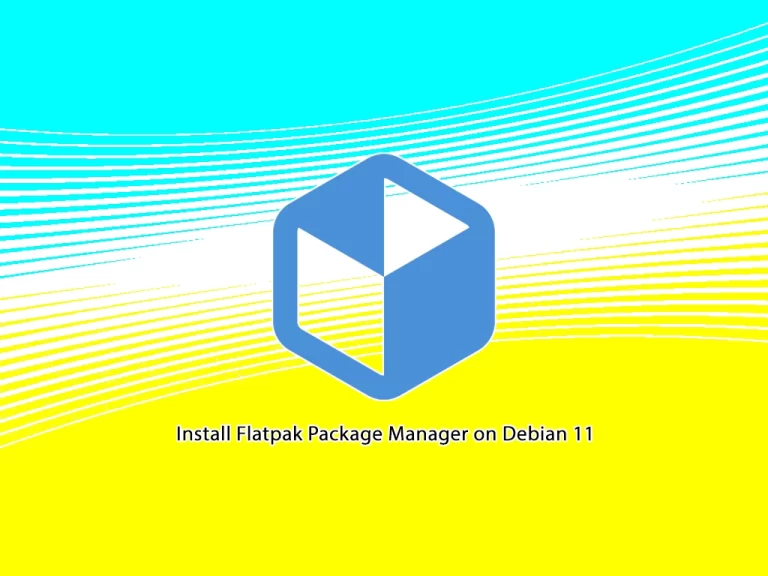Share your love
Install Flatpak Package Manager on Debian 11

This guide intends to teach you to Install and Use Flatpak Package Manager on Debian 11.
Flatpak is a package management utility that lets you distribute, install and manage software without needing to worry about dependencies, runtime, or Linux distribution. Since you can install software without any issues irrespective of the Linux distribution (be it a Debian-based distro or an Arch-based distro), Flatpak is called a universal package.
Steps To Install Flatpak Package Manager on Debian 11
To set up Flatpak, you must log in to your server as a non-root user with sudo privileges. To do this, you can follow our guide on Initial Server Setup with Debian 11.
Installation Steps of Flatpak on Debian 11
First, you need to update your local package index with the command below:
sudo apt updateThe Flatpak package is available on the default Debian repository. To install it, simply run the following command:
sudo apt install flatpak -yVerify your Flatpak installation by checking its version:
flatpak --versionOutput
Flatpak 1.10.8
Using Flatpak Package Manager on Debian 11
At this point, we want to show you how to use your Flatpak package manager.
Enable Flathub on Debian 11
Now you need to enable the Flathub before using the Flatpak. FlatHub is an efficient and popular platform used for searching applications.
To do this you can use the following command:
flatpak remote-add --if-not-exists flathub https://flathub.org/repo/flathub.flatpakrepoSearch Apps with Flatpak
To search for a specific app, you can use the following syntax:
flatpak search <Application_name>For example, search for OpenJDK:
flatpak search openjdkOutput
Name Description Application ID Version Branch Remotes
OpenJDK … The latest version of th… …dk.Extension.openjdk 21.08 flathub
OpenJDK … The latest version of th… …dk.Extension.openjdk 20.08 flathub
OpenJDK … The latest version of th… …dk.Extension.openjdk 19.08 flathub
OpenJDK … The latest version of th… …dk.Extension.openjdk 18.08 flathub
OpenJdk … OpenJdk 8 Sdk extension …k.Extension.openjdk8 22.08 flathub
OpenJdk … OpenJdk 8 Sdk extension …k.Extension.openjdk8 21.08 flathub
OpenJdk … OpenJdk 8 Sdk extension …k.Extension.openjdk8 20.08 flathub
OpenJDK … The LTS (long term suppo… ….Extension.openjdk17 22.08 flathub
OpenJDK … The LTS (long term suppo… ….Extension.openjdk17 21.08 flathub
OpenJDK … The LTS (long term suppo… ….Extension.openjdk17 20.08 flathub
OpenJDK … The LTS (long term suppo… ….Extension.openjdk11 22.08 flathub
OpenJDK … The LTS (long term suppo… ….Extension.openjdk11 21.08 flathub
OpenJDK … The LTS (long term suppo… ….Extension.openjdk11 20.08 flathub
OpenJDK … The LTS (long term suppo… ….Extension.openjdk11 19.08 flathub
OpenJDK … The LTS (long term suppo… ….Extension.openjdk11 18.08 flathubInstall an App with Flatpak Package Manager
When the desired application is searched, you can install it on Debian 11, using Flatpak.
flatpak install <Application_name>For example:
flatpak install openjdkThis will ask you which version you want to install.
Looking for matches…
Similar refs found for ‘openjdk’ in remote ‘flathub’ (system):
1) runtime/org.freedesktop.Sdk.Extension.openjdk8/x86_64/21.08
2) runtime/org.freedesktop.Sdk.Extension.openjdk10/x86_64/18.08
3) runtime/org.freedesktop.Sdk.Extension.openjdk/x86_64/18.08
4) runtime/org.freedesktop.Sdk.Extension.openjdk17/x86_64/20.08
5) runtime/org.freedesktop.Sdk.Extension.openjdk8/x86_64/22.08
6) runtime/org.freedesktop.Sdk.Extension.openjdk11/x86_64/18.08
7) runtime/org.freedesktop.Sdk.Extension.openjdk/x86_64/19.08
8) runtime/org.freedesktop.Sdk.Extension.openjdk17/x86_64/21.08
9) runtime/org.freedesktop.Sdk.Extension.openjdk11/x86_64/19.08
10) runtime/org.freedesktop.Sdk.Extension.openjdk/x86_64/20.08
11) runtime/org.freedesktop.Sdk.Extension.openjdk17/x86_64/22.08
12) runtime/org.freedesktop.Sdk.Extension.openjdk11/x86_64/20.08
13) runtime/org.freedesktop.Sdk.Extension.openjdk/x86_64/21.08
14) runtime/org.freedesktop.Sdk.Extension.openjdk8/x86_64/18.08
15) runtime/org.freedesktop.Sdk.Extension.openjdk11/x86_64/21.08
16) runtime/org.freedesktop.Sdk.Extension.openjdk9/x86_64/18.08
17) runtime/org.freedesktop.Sdk.Extension.openjdk8/x86_64/19.08
18) runtime/org.freedesktop.Sdk.Extension.openjdk11/x86_64/22.08
19) runtime/org.freedesktop.Sdk.Extension.openjdk10/x86_64/1.6
20) runtime/org.freedesktop.Sdk.Extension.openjdk8/x86_64/1.6
21) runtime/org.freedesktop.Sdk.Extension.openjdk9/x86_64/1.6
22) runtime/org.freedesktop.Sdk.Extension.openjdk8/x86_64/20.08
Which do you want to use (0 to abort)? [0-22]: 1When your installation is completed, you will get the following output:
Output
ID Branch Op Remote Download
ID Branch Op Remote Download
1. [✓] org.freedesktop.Sdk.Extension.openjdk8 21.08 i flathub 121.1 MB / 115.2 MB
Installing… ████████████████████ 100% 15.1 MB/s 00:00
Uninstall Apps with Flatpak
To uninstall an App with Flatpak, you can use the following syntax:
flatpak uninstall APP-IDFor example:
flatpak uninstall runtime/org.freedesktop.Sdk.Extension.openjdk8 Output
ID Branch Op
ID Branch Op
1. [-] org.freedesktop.Sdk.Extension.openjdk8 21.08 r
Uninstalling…
For more information, you can visit the Flatpak Docs page.
Uninstall or Remove Flatpak Package Manager
If you no longer want to use Flatpak, you can easily remove it with the command below:
sudo apt autoremove flatpak -yConclusion
At this point, you have earned to Install and Use Flatpak Package Manager on Debian 11.
Hope you enjoy it. For more guides and articles, you can visit the orcacore blog page.



